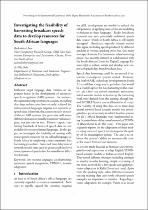 ResearchSpace
ResearchSpace
Investigating the feasibility of harvesting broadcast speech data to develop resources for South African languages
JavaScript is disabled for your browser. Some features of this site may not work without it.
- ResearchSpace
- →
- Research Publications/Outputs
- →
- Conference Publications
- →
- View Item
| dc.contributor.author |
Badenhorst, Jacob AC

|
|
| dc.contributor.author |
De Wet, Febe

|
|
| dc.date.accessioned | 2022-05-04T13:22:38Z | |
| dc.date.available | 2022-05-04T13:22:38Z | |
| dc.date.issued | 2021-11 | |
| dc.identifier.citation | Badenhorst, J.A. & De Wet, F. 2021. Investigating the feasibility of harvesting broadcast speech data to develop resources for South African languages. http://hdl.handle.net/10204/12380 . | en_ZA |
| dc.identifier.uri | https://doi.org/10.55492/dhasa.v3i03.3820 | |
| dc.identifier.uri | http://hdl.handle.net/10204/12380 | |
| dc.description.abstract | Sufficient target language data remains an important factor in the development of automatic speech recognition (ASR) systems. For instance, the substantial improvement in acoustic modelling that deep architectures have recently achieved for well-resourced languages requires vast amounts of speech data. Moreover, the acoustic models in state-of-the-art ASR systems that generalise well across different domains are usually trained on various corpora, not just one or two. Diverse corpora containing hundreds of hours of speech data are not available for resource limited languages. In this paper, we investigate the feasibility of creating additional speech resources for the official languages of South Africa by employing a semi-automatic data harvesting procedure. Factorised time-delay neural network models were used to generate phone-level transcriptions of speech data harvested from different domains. | en_US |
| dc.format | Fulltext | en_US |
| dc.language.iso | en | en_US |
| dc.relation.uri | https://upjournals.up.ac.za/index.php/dhasa/article/view/3820 | en_US |
| dc.source | Proceedings of the International Conference of the Digital Humanities Association of Southern Africa. 2nd workshop on Resources for African Indigenous Language (RAIL), Virtual, 29 November - 3 December 2021 | en_US |
| dc.subject | Automatic speech recognition | en_US |
| dc.subject | Data harvesting | en_US |
| dc.subject | Domain adaptation | en_US |
| dc.subject | Low-resource languages | en_US |
| dc.subject | TDNN-F | en_US |
| dc.title | Investigating the feasibility of harvesting broadcast speech data to develop resources for South African languages | en_US |
| dc.type | Conference Presentation | en_US |
| dc.description.pages | 9pp | en_US |
| dc.description.note | Presentation included in the Proceedings of the International Conference of the Digital Humanities Association of Southern Africa, 2nd workshop on Resources for African Indigenous Language (RAIL), Virtual, 29 November - 3 December 2021 | en_US |
| dc.description.cluster | Next Generation Enterprises & Institutions | en_US |
| dc.description.impactarea | Voice Computing | en_US |
| dc.identifier.apacitation | Badenhorst, J. A., & De Wet, F. (2021). Investigating the feasibility of harvesting broadcast speech data to develop resources for South African languages. http://hdl.handle.net/10204/12380 | en_ZA |
| dc.identifier.chicagocitation | Badenhorst, Jacob AC, and Febe De Wet. "Investigating the feasibility of harvesting broadcast speech data to develop resources for South African languages." <i>Proceedings of the International Conference of the Digital Humanities Association of Southern Africa. 2nd workshop on Resources for African Indigenous Language (RAIL), Virtual, 29 November - 3 December 2021</i> (2021): http://hdl.handle.net/10204/12380 | en_ZA |
| dc.identifier.vancouvercitation | Badenhorst JA, De Wet F, Investigating the feasibility of harvesting broadcast speech data to develop resources for South African languages; 2021. http://hdl.handle.net/10204/12380 . | en_ZA |
| dc.identifier.ris | TY - Conference Presentation AU - Badenhorst, Jacob AC AU - De Wet, Febe AB - Sufficient target language data remains an important factor in the development of automatic speech recognition (ASR) systems. For instance, the substantial improvement in acoustic modelling that deep architectures have recently achieved for well-resourced languages requires vast amounts of speech data. Moreover, the acoustic models in state-of-the-art ASR systems that generalise well across different domains are usually trained on various corpora, not just one or two. Diverse corpora containing hundreds of hours of speech data are not available for resource limited languages. In this paper, we investigate the feasibility of creating additional speech resources for the official languages of South Africa by employing a semi-automatic data harvesting procedure. Factorised time-delay neural network models were used to generate phone-level transcriptions of speech data harvested from different domains. DA - 2021-11 DB - ResearchSpace DP - CSIR J1 - Proceedings of the International Conference of the Digital Humanities Association of Southern Africa. 2nd workshop on Resources for African Indigenous Language (RAIL), Virtual, 29 November - 3 December 2021 KW - Automatic speech recognition KW - Data harvesting KW - Domain adaptation KW - Low-resource languages KW - TDNN-F LK - https://researchspace.csir.co.za PY - 2021 T1 - Investigating the feasibility of harvesting broadcast speech data to develop resources for South African languages TI - Investigating the feasibility of harvesting broadcast speech data to develop resources for South African languages UR - http://hdl.handle.net/10204/12380 ER - | en_ZA |
| dc.identifier.worklist | 25227 | en_US |





